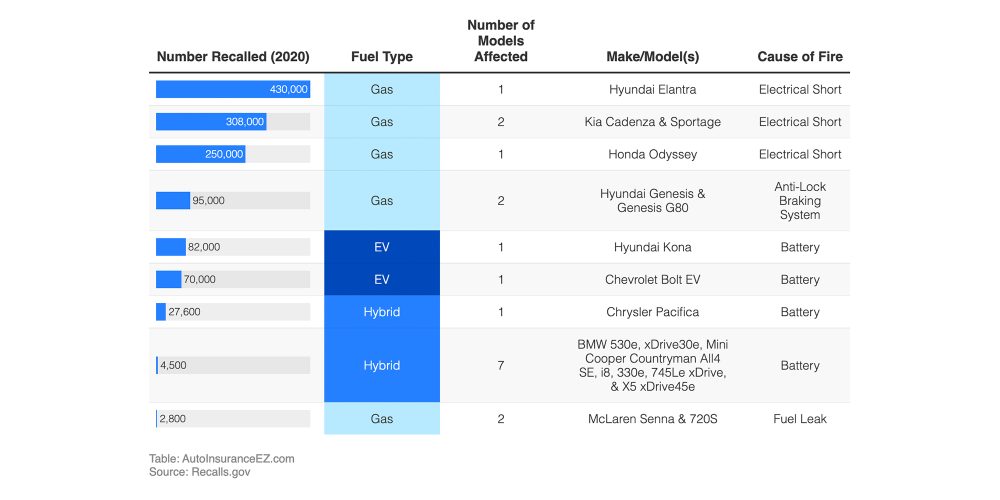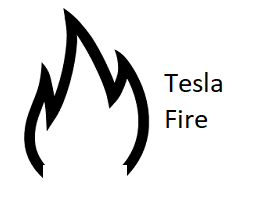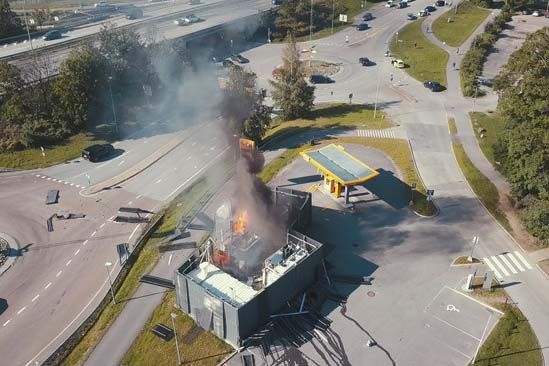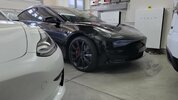Spend a few minutes watching the Wham Bam Teslacam channel on YouTube. You'll see lots of videos of Teslas that have been badly damaged in collisions without catching fire. Maybe seeing how much damage they routinely take without catching fire will help you see that they don't just burst into flames every time you look at them wrong.Wow everybody here is very biased. Nobody wants to admit that putting out a battery has its own challenges vs a ICE vehicle.
Welcome to Tesla Motors Club
Discuss Tesla's Model S, Model 3, Model X, Model Y, Cybertruck, Roadster and More.
Register
Install the app
How to install the app on iOS
You can install our site as a web app on your iOS device by utilizing the Add to Home Screen feature in Safari. Please see this thread for more details on this.
Note: This feature may not be available in some browsers.
-
Want to remove ads? Register an account and login to see fewer ads, and become a Supporting Member to remove almost all ads.
You are using an out of date browser. It may not display this or other websites correctly.
You should upgrade or use an alternative browser.
You should upgrade or use an alternative browser.
Curious about Battery Fire Risk
- Thread starter lionzer26125
- Start date
thesmokingman
Active Member
To help you with your search. In 2021 there were 174,000 car fires reported. Only 20 were Teslas. No fear at all to me.Not trying to paint a negative picture as I am in the process of buying one now if you look at my post history.
I am genuine worried if I get into a car accident in a tesla vs a ICE vehicle with my family in the car. If the Tesla is more likely to catch on fire during a crash or even randomly.
Also if you go on youtube and you search for any of the ICE brands there are not many videos of them being on fire. On the other hand there are so many Tesla vehicles there are so many videos of Tesla vehicles and fires. Dont give me the same old bullshit because media wants to take advantage or they are more likely to be reported.
Tesla Model S Plaid reportedly catches fire in Pennsylvania
No One is Talking About Electric Car Deaths, So I Have to
OP: Several posters have pointed out the fallacy of your anxiety.
ALL of your posts sound like you've made up your mind. That's fine. Don't buy an EV. Seriously.
ALL of your posts sound like you've made up your mind. That's fine. Don't buy an EV. Seriously.
WhiteOnWhiteMY
Member
If you have significant concerns with purchasing a Tesla due to concerns with a Battery Fire, I'd recommend sticking with a regular ICE altogether. It isn't worth your sanity while driving the vehicle. If you're purchasing any EV, these concerns are relatively the same. Statistically speaking, none. But if you believe the FUD about Teslas, you'll likely be dissatisfied in the long run by the consistent FUD and disinformation spread about Teslas and other EVs influencing your sentiment for the vehicle. You should be happy with your investment, and I worry you would just be concerning yourself into being dissatisfied by any EV.
BitJam
Active Member
Here is a paywalled (2021) article from Elon's good buddies at the New York Times: Hurdle to Broad Adoption of E.V.s: The Misperception They’re Unsafe
If you're worried about car fires, you are 60 times safer in an EV than in a conventional ICE vehicle and 150 times safer compared to a hybrid. If you are worried about safety in general, Teslas are the safest cars on the road.
Fully electric vehicles have fewer fires than gasoline-powered and hybrid cars, and their crash protection is at least equivalent.
Though these [highly publicized EV] fires generated headlines, E.V. angst appears to be unwarranted. AutoInsuranceEZ studied the frequency of fires — from all causes, including collisions — in automobiles in 2021. It found that hybrid vehicles, which have an internal combustion engine and an electric motor, had the most fires per 100,000 vehicles (3,475), while vehicles with just an internal combustion engine placed second (1,530 per 100,000). Fully electric vehicles had the fewest: 25 per 100,000. These findings were based on data from the National Transportation Safety Board and the Bureau of Transportation Statistics.
If you're worried about car fires, you are 60 times safer in an EV than in a conventional ICE vehicle and 150 times safer compared to a hybrid. If you are worried about safety in general, Teslas are the safest cars on the road.
lionzer26125: I suggest you start another thread asking "Are Teslas really the safest cars on the road?"
RoBoRaT
PoPeYeD'SaiLoRDuDe
This is the first time I see bullshit not converted to bull*sugar*..... Dont give me the same old bullshit because....
No worries here:
Attachments
Olle
Active Member
Are you using YouTube as evidence for how often cars catch on fire?Also if you go on youtube and you search for any of the ICE brands there are not many videos of them being on fire. On the other hand there are so many Tesla vehicles there are so many videos of Tesla vehicles and fires. Dont give me the same old bullshit because media wants to take advantage or they are more likely to be reported.
Why not look at some hard data instead?

Government data show gasoline vehicles are up to 100x more prone to fires than EVs
Aside from the argument that gasoline vehicles operate via combustion, a study shows how prevalent gas vehicle fires are compared to EVs.
 electrek.co
electrek.co
This issue has been beaten to death in this and many other EV forums.
EV can catch fire but so too can ICE vehicles. ICE vehicles catch fire much more often than EV. Anything that stores and releases large amounts of power has the potential to have an uncontrolled release of power in the form of heat (fire).
A Google search will yield all the info you need on this subject. I actually have proposed many times to have an early warning system on EV to alert those in proximity to a potential thermal runaway condition even though they are pretty rare in comparison to ICE vehicles.
If your really concerned about it then don't buy any EV but I think your more likely to have fire in your ICE than in an EV.
EV can catch fire but so too can ICE vehicles. ICE vehicles catch fire much more often than EV. Anything that stores and releases large amounts of power has the potential to have an uncontrolled release of power in the form of heat (fire).
A Google search will yield all the info you need on this subject. I actually have proposed many times to have an early warning system on EV to alert those in proximity to a potential thermal runaway condition even though they are pretty rare in comparison to ICE vehicles.
If your really concerned about it then don't buy any EV but I think your more likely to have fire in your ICE than in an EV.
Wow everybody here is very biased. Nobody wants to admit that putting out a battery has its own challenges vs a ICE vehicle.
Sure it has its own challenges, but the Model Y is still rated the safest car on the road. 93.71% of articles stating EVs have a higher rate of catching fire on the road are generally not putting the isolated numbers in proper context.
Attachments
SageBrush
REJECT Fascism
Also if you go on youtube
There is your problem. ICE fires are not interesting to youtube viewers, so they are not turned into videos.
Read valid statistics. Read fire related injuries and fatalities in vehicle accidents per million vehicles.
Start reading here:
Here is a snippet from the article, quoting Tesla on the subject
The Tesla quote requires context and is not the final word on the subject, but it should give you a clue that youTube is not a good source.Tesla claims that fuel-powered cars are about 11 times more likely to catch fire than a Tesla. It says the best comparison is fires per 1 billion miles driven. It says the 300,000 Teslas on the road have been driven a total of 7.5 billion miles, and about 40 fires have been reported. That works out to five fires for every billion miles travelled, compared to a rate of 55 fires per billion miles travelled in gasoline cars.
You should also know that ICE fires and Li-x battery fires are quite different. Gas tank fires explode, while Li-x fires develop relatively slowly and then require a lot of water to extinguish. You should read this to mean the following: EV occupants have time to get out of their vehicle, while ICE occupants are often crispy critters.
Bottom line: if you are not a troll, then you are simply very deeply misinformed. An EV is a much safer than an ICE, and a Tesla is the safest of them all.
Disclaimer: Our only car is a non-Tesla EV, but we have owned Tesla cars in the past and may again in the future. Tesla safety is industry leading, hands down.
Last edited:
OP, you are confusing probability with severity. As everyone is pointing out, probability of catching fire in an ev is really low and is even lower in Tesla (all bolts had to recall due to LG battery catching fire) but severity is higher if it happens because fire departments across the country are still adopting to the fact that lithium battery fire can’t easily be extinguished once it starts.
The battery pack is located deep in the middle of the chassis. If you hit something that hard for the battery to rapture, you are likely to be dead anyway. This is true for any car.
By the way, do you ever worry what happens when your phone battery explodes in your pocket or hand? They have the same lithium battery.
The battery pack is located deep in the middle of the chassis. If you hit something that hard for the battery to rapture, you are likely to be dead anyway. This is true for any car.
By the way, do you ever worry what happens when your phone battery explodes in your pocket or hand? They have the same lithium battery.
Welcome to the forum. Yes, a lot of folks here are biased and get defensive if you are critical to Teslas.Wow everybody here is very biased. Nobody wants to admit that putting out a battery has its own challenges vs a ICE vehicle.
That being said, I do have concerns about EV battery fires; however, they appear to happen much less often than ICE. It's one of those things you have to weigh when making a purchase.
It certainly appears that you are attempting to start an EV fire here. I guess we'll see how it takes to put it out.Wow everybody here is very biased. Nobody wants to admit that putting out a battery has its own challenges vs a ICE vehicle.
In the many minutes it takes for the fire department to arrive, you had better already be out of the vehicle (ICE or EV) or you likely be crispy.However, based on experience, battery fires are more difficult to eliminate and last longer.
The time and difficulty to put out the fire is a concern only for the backed up traffic.
MY1stEV
Member
Great question, I'm glad you asked. No.Do any of you guys have any worries about driving teslas and them catching fire?
There are a lot more videos on YouTube of people eating a 2 million Scoville unit corn chip than people eating a peanut butter sandwich, therefor one must assume people rarely eat peanut butter sandwiches.I am seeing a lot of videos about Teslas catching fire in crashes... Also if you go on youtube and you search for any of the ICE brands there are not many videos of them being on fire.
Vehicle fires are becoming less common, and I'm pretty sure that Tesla didn't account for any of those fires prior to 2010, and very, very few of the ones since.Plus I think the fires will become more common as more EVs are purchased.
True, but you are not required to remain in the car until the fire is out. You may exit at your earliest convenience, video the fire, and upload it to YouTube (don't forget to enable monetization!).According to events though battery fires last longer and are more difficult to extinguish.
Safety should be a primary concern when purchasing a family vehicle. If you are interested in the truth, and not sensationalization, someone has gone to the trouble to collect all of the known Tesla fires and consolidate them in one place. There are 3+ million Teslas, and this lists the known fires and fatalities to date. Note, not every one of these fires listed is a car, a few are MegaPacks, and I would proffer than the majority of these fatalities are from hitting immovable objects at 90+ mph and not from any secondary fire that resulted from the accident.I am genuine worried if I get into a car accident in a tesla vs a ICE vehicle with my family in the car. If the Tesla is more likely to catch on fire during a crash or even randomly.

Tesla Fire: Digital record of Tesla fire incidents
Tesla Fire records information about Tesla car fires and other Tesla fire incidents that received news coverage.
Olle
Active Member
I can't see any posts that claim that battery fires don't have their own challenges. They are less challenging, since batteries burn slower than gasoline. That's what's important, because it gives you a better chance to get out of the car. A burning battery pack needs to be quarantined for days, just because it burn so slowly. That's a challenge that I'd prefer over being toasted in a fossil car that releases several EVs' worth of energy in minutes or even seconds.Wow everybody here is very biased. Nobody wants to admit that putting out a battery has its own challenges vs a ICE vehicle.
If you still believe that liquid flammable fossil fuel is safer than battery power, you should immediately convert your cell phone to gas, just to be on the safe side.
Watts_Up
Well-Known Member
Don't forget about Hydrogen risk

 driving.ca
driving.ca

Hyundai, Toyota pause fuel-cell sales over explosion in Norway
Two people have been hospitalized after shockwave set off airbags
FLRifleman
Member
Both gas and electric cars can catch fire, either due to an accident or a flaw/failure. The fires in the Bolts, for example, were due to a battery manufacturing flaw.
With a battery powered car in an accident, the time for the damaged pack to build up enough heat to ignite will be much longer than a gas car, where fuel can spill on hot exhaust components. Therefore, you should have more time to exit the car. On the flip side, battery electric car fires are much more difficult to put out than a gas powered car.
Regarding how many battery electric cars just catch fire while parked due to a defect? That seems to be very, very low. The number of electric cars on the road however is also low, so we need a larger population with some statistics to really have those odds down.
The bottom line is I personally wouldn't be concerned about it, and this is coming from a critically thinking guy who's not a fanboy.
With a battery powered car in an accident, the time for the damaged pack to build up enough heat to ignite will be much longer than a gas car, where fuel can spill on hot exhaust components. Therefore, you should have more time to exit the car. On the flip side, battery electric car fires are much more difficult to put out than a gas powered car.
Regarding how many battery electric cars just catch fire while parked due to a defect? That seems to be very, very low. The number of electric cars on the road however is also low, so we need a larger population with some statistics to really have those odds down.
The bottom line is I personally wouldn't be concerned about it, and this is coming from a critically thinking guy who's not a fanboy.
Similar threads
- Replies
- 2
- Views
- 859
- Replies
- 5
- Views
- 561
- Replies
- 32
- Views
- 2K
- Replies
- 24
- Views
- 2K




